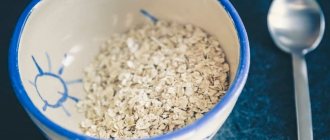The calorie content of flaxseed oil per 100 grams is 898 kcal. 100 g of product contains:
- 0 g protein;
- 0 g carbohydrates;
- 99.8 g fat.
Flaxseed oil is rich in vitamins B, A, E, F, D, PP, as well as calcium, potassium, selenium, magnesium, zinc, manganese, sodium, phosphorus, iron and other minerals.
Read: Calorie content of mashed potatoes with water and butter
Flaxseed oil: benefits and harms, calorie content
Flax has long been cultivated in Rus' as a special crop. It was eaten, woven into linen, and remembered for its wonderful healing properties. Today, flax is grown in much smaller quantities. Many people have forgotten about such a wonderful product as flaxseed oil. Its benefits and harms must be known, firstly, in order to start using it regularly, and secondly, to do it correctly. People who started using it noticed a surge of strength after a while. This is not surprising given its unique composition. This is a real health pantry.
When looking at the packaging, first of all, look for confirmation that this is natural linseed oil. Its benefits and harms lie in both the method of processing and storage. Only a cold-pressed product using ancient technology can give you health. Later we will explain why it is so important to avoid heating the seeds.
Let's move on to the composition. It’s hard to expect that we will find anything other than fat in it. That’s right, 9.6% are saturated fats, the rest are unsaturated fatty acids, known to everyone Omega-3, 6 and 9. This amount is not even found in sea, red fish. That is, you can get the entire group of omega fatty acids simply every morning by consuming flaxseed oil.
The benefits and harms of this product are assessed based on their packaging and storage conditions, which we will return to later. In addition, the oil is rich in vitamins A, D, B and F. This is an important complex of essential substances.

Of course it is very big. Let's look at what food energy consists of? That's right, from the nutrients they contain. And since the oil is completely free of proteins and carbohydrates, we try the following formula: 1 g of fat contains 9 kcal. We continue the calculations, 99.8*9=898 kcal. This is a lot, and can make you wonder whether flaxseed oil is worth consuming. The benefits and harms of this product can be considered based on the quantity. A tablespoon of oil will give you only 90 kcal and add health.
Application
Valuable and healthy flaxseed oil is successfully used in areas such as the food, pharmaceutical and cosmetic industries. For culinary purposes, it is used as a dressing for vegetable salads, as well as all kinds of side dishes.
Market Analytics
- Black Lives Matter movement: reaction and consequences for the beauty industry
- COVID-19 is changing the rules of the game in the cosmetics market
- Beauty of the future: cosmetic innovations 2021
Convenient search for beauty salons on our website
Beauty salons in Moscow Beauty salons in St. Petersburg Beauty salons in Ekaterinburg Beauty salons in Novosibirsk
Latest blog posts on our website
- Naturecream / Tremella Extract - Snow Mushroom Detox for Skin
- Prostye-sovety / How to visually enlarge your lips with makeup
- Naturecream / Apricot kernel oil for face
- Naturecream / MATRIXYL3000 - the best skin elasticity stimulator
- Naturecream / SPF in Natural Oils
- Naturecream / Geranium (Pelargonium) oil for skin health and beauty
- Prostye-sovety / Save on a beauty salon: procedures that can be done at home
- Naturecream / Growth Factor - brings back youth?
- Oksana-Lezina / 3 effective abdominal exercises from a fitness instructor for beginners
- Prostye-sovety / Making perfect curls at home
Latest forum topics on our website
- Natalya / How to properly make a gelatin mask?
- Mrs._Smith / Badly sunburned! What to do?((
- Ice / Is it necessary to combine fitness classes with a diet?
- Antonova / What can be used for hair loss?
- Radio operatorKat / Who was on a protein diet?
Other articles in this section
| Lemon oil In the world ranking of citrus fruit production, lemons are in third place, behind oranges and tangerines. Fresh unripe lemon fruits produce high quality 100% natural lemon oil. It is a transparent oily substance with a yellow or green tint and a unique lemon aroma. After a certain period of time, the color of the oil may change and turn brown. |
| Pine nut oil Pine nut oil is a truly unique, environmentally friendly natural product, which is obtained by cold pressing the grains (kernels) of pine nuts, which contain a large amount of useful substances. It is worth noting that there are no analogues of cedar oil in nature; moreover, artificial synthesis of this product is impossible. |
| Nutmeg Oil European explorers traveled around the world in search of the spice nutmeg, and not without good reason. Nutmeg, or Nutmeg oil, is not just a popular cooking ingredient with a sweet, warm, spicy aroma. It also has a wide range of medicinal properties, which made it a part of ancient cultures. Nutmeg oil is not only an expensive spice widely used in haute cuisine, but also an important component of traditional Chinese Indian medicine. |
| Butter Butter is a nutritious natural product that is produced from cow's milk by separation or churning. This product is high-calorie and easily digestible, characterized by a high milk fat content - 50-82%. |
| Chicken fat It is not for nothing that chicken meat and fat are considered excellent dietary products. The use of these products is not limited to culinary delights. Their healing effect is also well known. |
| Rapeseed oil Rapeseed oil is produced from the seeds of the plant of the same name. Its origin has not been precisely established at this time. According to experts, rapeseed does not grow in the wild, but people have been cultivating it for six thousand years. It is also reliably known that rapeseed has been grown in Russia since the nineteenth century (rapeseed enriches the soil with nitrogen and various microelements). At the same time, it is possible to grow it in areas with rather harsh climate conditions, which is inaccessible to most plants from which oils are produced. |
| Avocado oil Avocado is an exotic fruit with a rich vitamin and mineral composition. Avocado oil is obtained by cold pressing the pulp of the fruit. The resulting product has an emerald color that changes to brown when exposed to sunlight. The oil has a barely noticeable odor. |
| Rendered pork fat |
| Soybean oil Soybean oil is a natural product of plant origin, which is obtained from soybean seeds (soybeans) by mechanical or extraction method. At all times, soybean oil, like other soybean products, has been the most popular and healthy product among representatives of the Asian race. Soybean plants are cultivated in Eastern and Central Asia, Korea, Indochina, North America and other Eastern regions. |
| Pumpkin oil Pumpkin oil is a natural product of plant origin, which is obtained by cold pressing from pumpkin seeds. The unique beneficial properties of this product were known back in ancient times, and pumpkin oil was called “black gold”, since the cost of a small bottle of pumpkin oil was equal to the cost of a gold ring. |
Flaxseed oil: benefits and harms
The beneficial properties of flax are unknown to many people, so they pass by shelves with this product. This is understandable, we are used to using sunflower oil. But it’s completely in vain. The benefits and harms of flaxseed oil is a topic that can be discussed endlessly. Let's start with the first one. What good will we get if we use this product? It contains a huge amount of fatty acids. The Omega-3 content is even higher than in fish oil, from which children previously suffered so much. Swallowing fish oil is not the most pleasant procedure, while eating a salad dressed with one or two tablespoons of oil will not be difficult.
What happens if the body receives enough fatty acids day after day? Then the metabolism and, first of all, fat metabolism are normalized. This is important for all organs and systems, and as a result leads to weight normalization.
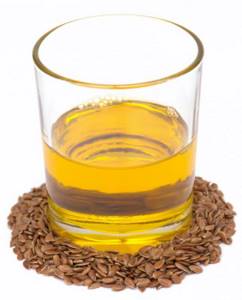
Although losing weight is not the main goal, flaxseed oil indirectly solves this problem, although not too quickly.
If we consider flaxseed oil not as a panacea, but as a prophylactic agent, then it is indeed extremely useful. With regular use, the risk of coronary disease, diabetes and even cancer is reduced. Recent studies have shown that the peel of flax seeds contains natural components that are a natural blocker of cancer cells. Flaxseed oil contains almost the entire complex of B vitamins, so necessary for the nervous system. The vitamin E it contains is an antioxidant and a real elixir of youth. Linolenic acid strengthens the immune system.
Olive oil calories. Why is olive oil back in fashion?
Provençal, wood or olive oil was extremely popular back in Ancient Egypt, ancient Greece and Rome. Today it is on everyone's lips again. They talk about it on culinary talk shows, it is recommended by nutritionists, and cosmetologists talk about the wonderful properties of this product. Why exactly has it become the focus of attention of those who watch their figure and try to adhere to a healthy diet?
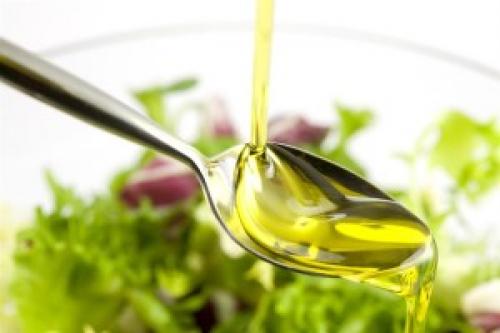
The point is both in the large set of useful properties and in the peculiarities of the technology for its production. Unlike other vegetable oils, it is extracted from seeds without the use of solvents or heat treatment. This allows you to preserve the entire set of nutrients and the unique aroma of olives. Unlike mayonnaise, it does not contain “chemicals”.
Olive oil, whose caloric content per 100 grams is 898 kcal, can hardly be called dietary. But such a high calorie count shouldn't scare anyone trying to lose weight. Unlike animal fats, it not only does not add weight, but even helps to reduce it, as it reduces the number of fat cells.
Now many are concerned about how to get rid of “bad” cholesterol. Since olive oil contains unsaturated fats, it reduces its amount, but does not reduce the concentration of beneficial ones. This way, the optimal balance of these important elements in the body is maintained. In addition, the oil was found to have anti-cancer properties and prolong life.
Flaxseed oil: benefits and harm. Tips for use
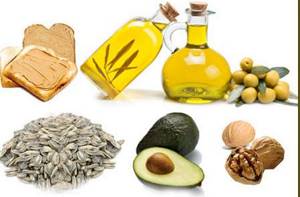
First you need to choose the right product. It should only be cold-pressed oil made using old technology. But that is not all. Pay attention to the bottles in which it is packaged. Flaxseed oil oxidizes quickly, so containers made of transparent glass or plastic are not suitable for it; the container should be darkened. Otherwise, instead of vitamins and healthy fatty acids, you can get substances that can only cause harm.
Now let's pay attention to the timing. Storing flaxseed oil unopened is only possible for 12 months. Once opened, it should be kept in the refrigerator and consumed within a month.
Another important point is related to cooking, which involves heating to high temperatures. The harm and benefits of flaxseed oil are closely related to this. Drinking a spoonful of cold oil on an empty stomach will give the body a large amount of useful substances. When heated above 60 degrees, all components turn into complete carcinogens and can cause serious harm.
Indications for use
What does flax seed extract treat:
- Diseases of the cardiovascular system.
- Diabetes.
- Disorders of the nervous system, including those caused by intense mental work and age-related.
Doctors recommend using flaxseed oil for medicinal purposes:
- If you are significantly overweight.
- Metabolic disorders.
This herbal product is an effective prevention of malignant neoplasms. This product is also useful for the skin - it is used for psoriasis, dermatitis, acne and other dermatological problems. If you are sunburned, apply flaxseed extract to your skin.

Why flaxseed oil is taken internally:
- From impotence.
- For symptomatic manifestations of menopause (sweating, irritability, dry mucous membranes).
- For constipation.
Eating flax extract is indicated as an adjuvant in the treatment of infertility, impotence and other reproductive disorders in women and men.
We recommend reading: How to use flaxseed oil for hair loss and growth
Application in cosmetology
In the pharmacy you can see a lot of exotic oils: shea, jojoba, cumin and many others. After reading reviews, we rush to buy expensive jars, forgetting that there is an original Russian oil, which leads among all others in its beneficial properties. Of course, we are talking about flaxseed oil.

If you have dry skin on your face and hands, you can apply a thin layer of oil to your skin every evening to get rid of flaking. The only negative is the specific smell, which you can put up with.
Calorie content of 1 tbsp flaxseed oil. Flaxseed oil: calorie content 100 grams, 1 tablespoon
Many have not even heard of such a product as flaxseed oil. Its calorie content, like other vegetable fats, is quite high. However, the product is used to combat obesity. How is this possible? Is it true that it helps you become thinner and lighter?
Why and who needs to know how many calories are in flaxseed oil?
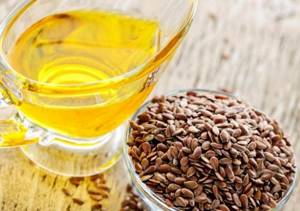
The raw material for producing flaxseed oil is flax. It is extracted from the grains of this plant through cold pressing. The oil is golden yellow or brown in color and has a slightly bitter taste. Its smell is reminiscent of the aroma of fresh grass (if it is poorly cleaned, it acquires the “aroma” of fish oil).
Since time immemorial, this product has been widely used for medicinal purposes. Today it is actively used in cosmetology. Followers of a healthy diet are happy to include flax seed oil in their menus. The easiest way to use it is to season salads with fresh vegetables. It is also added to porridge or eaten simply with a piece of black bread.
High-quality flaxseed oil, although its energy value is quite high, helps to normalize weight. To do this, it is advised to take 1 tsp on an empty stomach. Thus, data on the calorie content of this product will be useful to those losing weight and those who monitor their figure and health.
What is the calorie content of natural flaxseed oil and dishes containing it?
The fact that its calorie content per 100 grams reaches 898 kcal speaks volumes about how nutritious flaxseed oil is! The lion's share of the substances in this product are fats: their amount reaches 99.8 g. As already noted, the calorie content of flaxseed oil is no less high: just 1 tablespoon of this product will provide 152.7 kcal. And a teaspoon contains 44.9 kcal.
You cannot fry in such oil: this will deprive it of its beneficial properties. But it’s great for porridges. The main thing is to remember that only 1 tbsp. l. per day will be enough to heal the body and saturate it with important microelements.
How many calories will a dish with such a hearty ingredient put into your body? Depending on the recipe, the energy value will be as follows:
- vegetable salad (cabbage, celery, green onions, carrots, cucumber, tomato, red pepper, herbs), dressed with oil - 43 kcal;
- dietary salad (cucumber, sweet pepper, tomato, oil) – 44 kcal;
- Chinese cabbage and flaxseed oil – 95 kcal;
- lentils with butter – 113 kcal;
- barley porridge with flax product – 133 kcal;
- medicinal composition “Elixir of Youth” (ingredients – lemon, honey, garlic, linseed oil) – 350 kcal.
What place does flaxseed oil take among vegetable fats in terms of calorie content?

When choosing which oil to choose so as not to harm your figure, it is wrong to take calorie content as the main guideline. But still, taking into account this indicator, the places among vegetable fats were distributed as follows:
- sunflower, corn, peanut and apricot - 899 kcal each (per 100 g);
- flaxseed, olive, mustard – 898 kcal each;
- almond – 816 kcal.
So there is no clear leader among these products. Flaxseed oil does not lag behind and is not inferior to its “competitors” in terms of calories.
Flaxseed oil for weight loss and more
How did such a nutritious and high-calorie product manage to gain fame as a dietary food? The oil has a positive effect on metabolic processes, it improves digestion and, accordingly, helps to lose weight. But these abilities will only be revealed if a person leads an active lifestyle and eats right.
- Is stewed cabbage healthy?
Consuming flaxseed oil will help you get beautiful hair and strong nails. Regular use of this product will benefit the gastrointestinal tract and improve the functioning of the nervous, cardiovascular and endocrine systems. If you are planning to use it to become slimmer, then be patient. Good results can only be achieved with long-term and correct use.
Attention, TODAY only!
Dietary properties:
What calorie content does flaxseed oil have, what dietary properties does it have? All this is of great interest to those who lead a healthy lifestyle and monitor their health and figure. So we will try to answer these questions in the next article.

This original Russian product was eventually replaced by vegetable oils that were cheaper to produce. However, linseed oil still surpasses many of them in its properties.
It contains omega-3 polyunsaturated fatty acids, and it contains twice as much as fish oil.
The ratio of omega-3 and omega-6 fatty acids in flaxseed oil (1 tablespoon): omega-3 - 7.195 mg (4.2 times more than omega-6); omega-6 - 1.715 mg.
In terms of its biological value, flaxseed oil occupies one of the first places among edible oils. This product is also valued for its content of vitamin F and vitamins A and E and is an excellent preventive measure for vascular diseases and the formation of blood clots.
Beneficial features
What are the benefits of flaxseed oil:
- Significantly reduces the risk of heart attacks and strokes due to its anti-sclerotic properties: flax seed oil increases the concentration of beneficial lipoproteins in the blood and reduces the amount of harmful ones - the same ones that form plaques on the walls of blood vessels and contribute to the development of atherosclerosis.
- Fatty acids improve memory abilities and concentration by protecting neurons and communication between them. With aging, these properties of the nervous system decline, hence Alzheimer's disease and other age-related illnesses. In addition, psychiatrists and neurologists recommend consuming flaxseed oil regularly in small quantities to:
- Avoid depression.
- Increase stress resistance.
- Prevent the development of psychoneurological pathologies, for example, childhood attention deficit disorder.
Older people who introduce a little flax juice into their diet maintain mental clarity, good memory and attention longer.
- Prevents the development of hormone-dependent neoplasms (breast cancer in women, prostate adenoma in men). Treatment of female and male infertility will be more effective if you consume 1-2 tablespoons of unrefined flax extract per day along with various dishes.
- Helps reduce blood sugar by stimulating the production of insulin in the pancreas. The use of flaxseed oil for medicinal purposes in diabetes mellitus types I and II will reduce the risk of developing polyneuropathy, one of the most serious diabetic complications.
- “Starts” the work of the intestines, helps normalize gastrointestinal motility. Gastroenterologists advise taking flaxseed oil for constipation - this extract changes the consistency of feces and facilitates their removal from the body. And the antioxidants contained in the product protect us from the harmful effects of nitrites and nitrates, which vegetables and fruits are rich in.
- Accelerates biochemical reactions in the body, which has a positive effect on weight normalization (with strictly dosed use - do not forget about the calorie content!).
- It has a beneficial effect on tissue regeneration and has an anti-inflammatory effect. Thanks to this property, linseed oil has found wide application in the manufacture of ointments, liniments, and other external medicines. The regenerative and anti-inflammatory effect has led to the use of flaxseed oil in cosmetology for the production of moisturizers and other creams.
Nutritionists do not give a definite answer to the question of which oil is healthier, olive or flaxseed, but flax extract is richer in composition. Although there is almost 10 times more vitamin E in olive oil, that’s why they love to use it for nails and hair.
Composition of linseed oil:
Vitamins:
Minerals:
Flaxseed oil has an anti-inflammatory, enveloping, diuretic, mild laxative and bactericidal effect. It is used to treat inflammation and stones in the kidneys and bladder.
Scientists have proven that using flaxseed oil in food reduces the likelihood of stroke by 37%. In addition, the use of oil will help avoid diabetes, atherosclerosis, coronary heart disease, etc.
- It not only perfectly cleanses the body of toxins, but also has a beneficial effect on it, stimulating and supporting important physiological processes. It's very useful.
- Helps the body cope with the destructive effects of pesticides and other industrial poisons. This oil is considered one of the best cleansers. A tablespoon of flaxseed oil once or twice a day is a must for everyone.
- It helps prevent the development of heart disease, arthritis, osteochondrosis and even cancer and strengthens cell membranes, as it is rich in omega-3 fatty acids. Use flaxseed oil when preparing salads and other cold dishes - such a replacement will improve your health. If you don't like the taste, try flaxseed oil with cinnamon.
- A good antiallergen, it is recommended for use by patients with bronchial asthma.
- Normalizes blood pressure, reduces the risk of heart attacks and strokes, and helps normalize lipid metabolism. Has a beneficial effect on intestinal function.
- Nourishes nerve cells, primarily brain cells. Improves the endocrine system and improves the function of the genital organs.
- It must be included in the children's diet, especially if the child consumes a small amount of fatty varieties of sea fish. Oil can be added to porridge or mashed potatoes. Eating oil in salads is the best way to replenish the supply of fat-soluble vitamins found in vegetables and saturate the brain with linolenic acid.
- This oil is unstable. Protect it from exposure to sunlight and high temperatures. Do not buy oil stored in light or in transparent containers. At a temperature not exceeding + 10 °C, the oil is stored for 1 year.
Composition of flax oil
Our ancestors began to use flaxseed oil from ancient times, without really thinking about why it was so useful. Nowadays, scientists have studied this valuable product and found that its healing qualities are due to:
- Vitamins (E, K, B, A, F, D, PP).
- Unsaturated fatty acids (half of which are Omega-3, the rest is equally divided by Omega-6 and Omega-9).
- Saturated fatty acids (palmitic, stearic - one tenth of flaxseed extract consists of these substances).
- Macroelements (phosphorus, calcium, potassium, magnesium, sodium, iron).
- Microelements (zinc, selenium, manganese).
- Sterols.
As with any plant product, flax seed extraction contains no cholesterol.
The chemical composition of flaxseed oil is unique in that the different components together form a useful product that affects the functioning of the entire body. Unsaturated fatty acids are especially useful - the human body cannot produce them and must take them from foods, but without them a full metabolism is impossible.
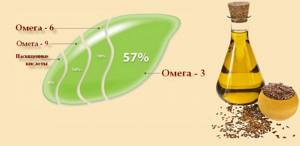
What makes flaxseed oil especially valuable is its composition of vitamins. Reproductive function and immune status are supported by vitamin E. It is also responsible for the smooth functioning of the body’s engine – the heart, and strengthens and makes blood vessels elastic.
Saturated fatty acids take part in thermoregulation - thanks to them, the body adapts to heat and cold. The maximum daily dose of these substances is up to 15 g. Anything more is already harmful.
Without phosphorus and calcium, it is impossible to “build” strong bone tissue and dental dentin (solid matter), and sterols are involved in biological processes and the structure of the cell membrane.
This product is available with various additives, such as selenium. Oil enriched with microelements and other substances is used purposefully to combat any problem, but it is used after consultation with a doctor.
The greatest benefit comes from unrefined flaxseed oil, which is obtained by cold pressing the seeds. In such a product, the medicinal properties of the product remain in their original form.
There is a distinction between white flax oil and black flax oil (although more precisely, brown). These extracts differ not only in color (white flax oil is lighter): the brown extract is richer in fatty acids, but it has a sharper characteristic taste. Using one of the two types is a matter of taste.

Benefits of flaxseed oil
The following benefits of flaxseed oil are known:
- the product is one of the best sources of Omega 3, 6, 9 polyunsaturated fatty acids;
- the rich vitamin and mineral composition of the oil makes it indispensable for pregnant and lactating women;
- the anti-inflammatory and anti-cancer properties of flaxseed oil have been proven;
- the oil normalizes blood pressure, restores hormonal balance in the body, reduces the level of bad cholesterol;
- in many traditional medicine recipes, flaxseed oil is used as a natural laxative;
- With regular consumption of flaxseed oil, the condition of nails and skin improves;
- The acids contained in the product help reduce appetite. This is why flaxseed oil is used in dietary nutrition;
- The benefits of flaxseed oil are known for strengthening the walls of blood vessels, as well as preventing heart disease.
Calories and nutritional value
The caloric content of flaxseed extract is quite high - 898 kcal is contained in 100 grams of the product. As for nutritional value, we immediately remove carbohydrates and proteins from the BJU formula - they are not present in flax seed extract. But 99.8% fat.
These features of flax squeezing require a careful approach to its culinary use. Only moderate consumption will be correct, otherwise the benefits will turn into harmful consequences. Dietary nutrition involves small doses of flax juice added to fresh vegetable salads and cereal dishes - this is how the product brings the greatest benefit, and its components are completely absorbed.
To make it more convenient to count calories, you need to know how much flaxseed oil is in a tablespoon. This cutlery holds 16 g of product and, accordingly, about 110 kcal. Two tablespoons is the daily dose, according to the recommendations of nutritionists.
In cooking, there are debates about which is healthier, flaxseed oil or flaxseed. It all depends on the method of application, but in any case, the squeeze contains less unnecessary and more useful substances. And flax seed adds an original taste to salads, baked goods and other dishes, although the beneficial component is much smaller.




